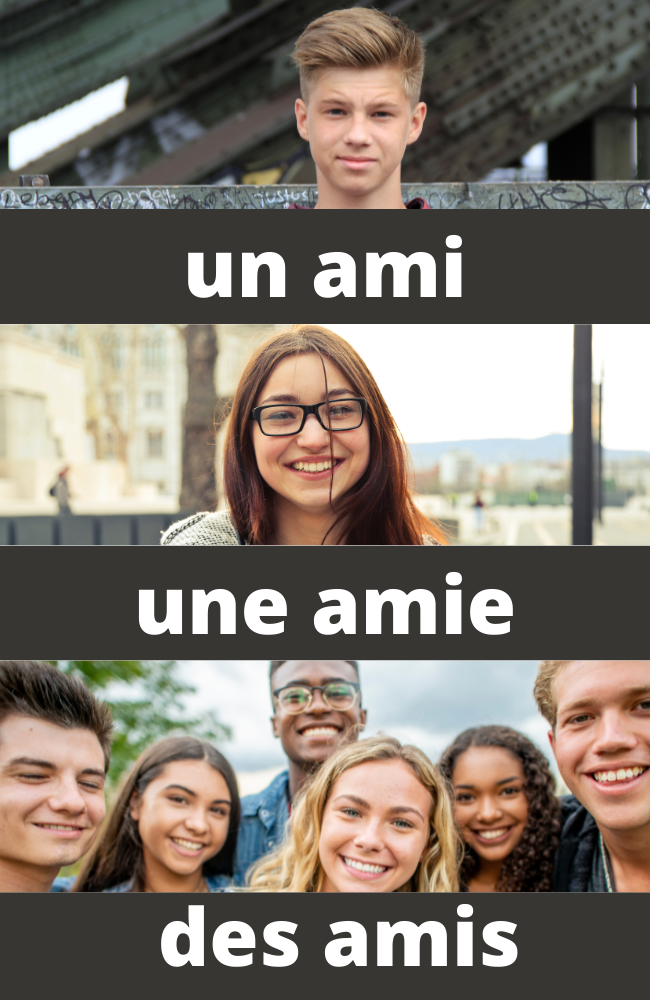Friend in French is “ami(e)” (pronounced ah-mee). Another French word for friend is “copain/copine”. This post will examine how to pronounce ami and copain, explore their subtle differences and present some common expressions. Keep reading!

How to pronounce ami and copain
Before we go any further let’s have a look at how to pronounce the two French words for friend. The pronunciation of “ami” is ah-mee. The feminine form, “amie” has the exact same pronunciation.
un ami, une amie
friend
The other word for friend, “copain” is a bit harder to pronounce. The “ain” letter combination sound like the nasal “in” in the word “inviter” (to invite) and is written with the pronunciation symbol “ɛ̃”.
un copain, une copine
friend

1) “A friend” and “The friend”
In this section we’ll look at how to say “a friend” and “the friend” in French.
“A friend” is “un ami” or “une ami” (masculine and feminine forms). “Some friends” is “des amis”. Here are some example sentences:
J’ai un ami à Paris.
I have a (male) friend in Paris.
J’ai une amie en Suisse.
I have a (female) friend in Switzerland.
J’ai des amis à Montréal.
I have (some) friends in Montreal.
To say, “the friend” say “l’ami” and “l’amie”. The pronunciation is the same in both the masculine and feminine form. This is because “le” and “la”, the words for “the” both become l’ before a vowel. “The friends” in the plural form is “les amis”. Here are some example sentences:
L’ami de Sarah s’appelle Jean.
Sarah’s friend is named Jean.
L’amie de Sylvie s’appelle Julie.
Sylvie’s friend is named Julie.
Les amis de Marc habitent au Canada.
Marc’s friends live in Canada.
The is page on our site covers the definite articles (le, la, les) and indefinite articles (un, une, des) in detail.
My friend
In French, “my friend” in the masculine form is “mon ami” (pronounced mohn-amee). The feminine form of “my friend” is also “mon amie”. The “mon” in the feminine form is a kind of liaison. They are pronounced the exact same.
mon ami, mon amie
my friend
“My friends” in French is “mes amis” in the masculine form and “mes amies” in the feminine form. The pronunciation for both is the same: [mays-amee]. Here are some example sentences.
Thomas est mon ami. Thomas is my friend.
Sarah est mon amie aussi.
Sarah is also my friend.
Thomas et Sarah sont mes amis.
Thomas and Sarah are my friends.
2) Copain/copine – another to say friend in French
As mentioned above, the word “copain” in the masculine form and “copine” in the feminine form also mean friend in French. Generally speaking, the word “copain” is slightly less formal than “ami”. Thus, “un bon copain” could translate to “a good buddy” or “a good pal”.
Explained slightly differently, “ami” could refer to a more serious lifelong friend, whereas “copain” could a more casual friend or even a good acquaintance. Here are some example sentences:
J’ai un copain à Paris.
I have a friend in Paris.
Julie est une copine de Sarah.
Julie is Sarah’s friend.
Nous avons quelques copains à Londres.
We have a few friends in London.

3) Boyfriend and girlfriend in French
In French, the word for boyfriend is “un petit copain”, which translates literally to “a little friend”. The word for girlfriend is “une petite copine”. For example:
Marc est le petit ami de Julie.
Marc is Julie’s boyfriend.
Julie est la petite amie de Marc.
Julie is Marc’s girlfriend.
Interestingly, the meanings of “copain” and “copine” become boyfriend and girlfriend when proceeded by the possessive adjectives (mon and ma). Observe:
Marc est un copain.
Marc is a friend.
Marc est mon copain.
Marc is my boyfriend.
Or:
Sylvie est une copine.
Sylvie is a friend.
Sylvie est ma copine.
Sylvie is my girlfriend.
Ex boyfriend and ex girlfriend
In French to say ex-boyfriend or ex-girlfriend, simply put “ex” before either petit ami/petite amie or copain/copine. You can also use the words ancien/ancienne. For example:
- Marc est l’ex petit ami de Julie. Marc is Julie’s ex-boyfriend.
- Julie est l’ancienne petite copine de Marc. Julie is Marc’s ex-girlfriend.
Boyfriend and girlfriend in French Canadian
In Quebec and the rest of French-speaking Canada, the word for boyfriend is “un chum” and girlfriend is “une blonde”. For example:
- Mon chum s’appelle Yves. My boyfriend’s name is Yves.
- Ma blond s’appelle Caroline. My girlfriend’s name is Caroline.
4) How to say pal and buddy
French has a fun word used to express “pal” or “buddy”: “un pote”. Pote also translates to “mate” and “bro”. For example:
Salut mon pote ! Ça va?
Hey buddy! How’s it going?
Friendship in French
The French word for “friendship” is “l’amitié” (pronounced amee-tee-ay; feminine noun).
amitié
friendship
- Notre amitié dure depuis le lycée. Our friendship has lasted since high school.
Expressions and more words containing friend in French
The following is a list of several expressions relating to the words “ami” in French or “friend” in English.
- C’est dans le besoin que l’on reconnaît ses amis. A friend in need is a friend indeed. The literal translation of this expression is: It’s in need that one recognizes his/her friends.
- Meilleur ami, meilleure amie best friend
- Ami(e) de cœur, ami(e) intime, ami(e) prohce close friend, bosom friend
- Ami cher, amie chère dear friend
- Ami(e) peu fiable fair-weather friend (literally an unreliable friend)
- Faux ami false cognate (A situation when a word is the same or almost the same in two different languages but have two unrelated meanings).
- Ami(e) de la famille family friend
- Ami (or compagnon à quatre pattes four-legged friend
- Bon ami, bonne amie a good friend
- Ami commun, amie commune mutual friend
- Vieil ami, vieille amie, ami(e) de longue date old friend
Conclusion
Congratulations! You now know how to say “friend” in French. Now check our our lessons covering how to say “no problem” and our list of family members vocabulary.


